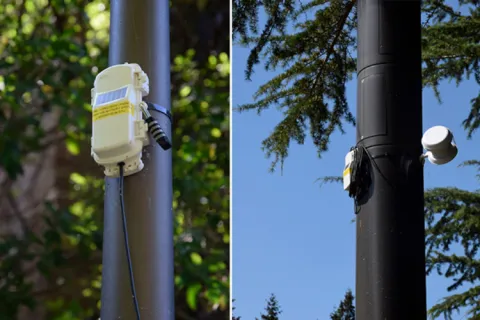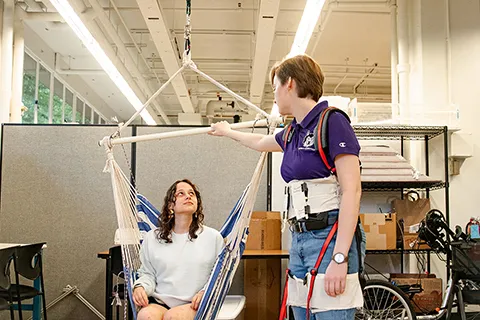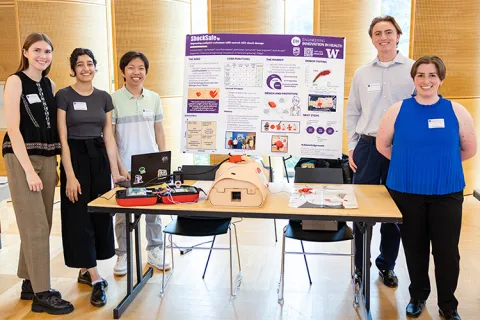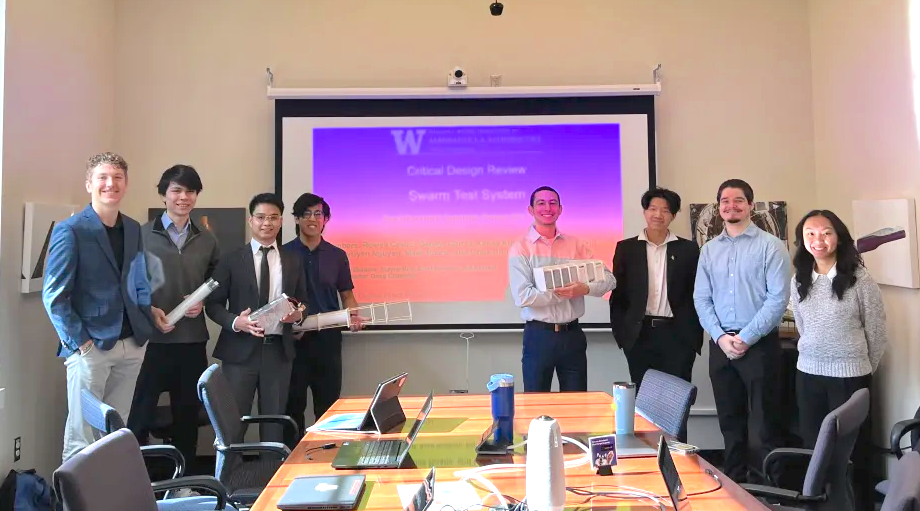AeroVironment
Swarm Test System
Testing, experimentation, and demonstration are important elements of system development and marketing, but when huge quantities of single-use airplanes and launchers are used, testing costs can become significant. This student team worked to develop a low cost, modular, reusable, platform for swarming that is easy and quick for a couple of people to setup, deploy, operate, recover, and re-use. This student team worked to build and demonstrate one system, designed so that a single person could operate a dozen at a time. This student team also worked to specify a nominal size, weight, and power sufficient to support many kinds of payloads, including some combination of intelligence, surveillance, and reconnaissance; mapping, communications relay, electronic warfare/attack, chem/bio/radiological/nuclear detection, and net capture. This student team worked to demonstrate fully automated mission upload, launch, waypoint navigation, recovery, and re-use. The student team also worked to recover the aircraft within a radius of 20m 3σ of a geolocation. The student team worked to create launch and recovery accuracy tolerant to 7 mph, level flight range: 20km, cruise speed > 20 m/s, and the ability to meet requirements up to 5,000ft. In addition to other specifications, the time from start of assembly to launch that the student team worked toward is 10 minutes for a single unit. The time between recovery and relaunch the student team worked toward is 20 minutes for a single unit. The outcomes this student team worked toward include gaining useful design experience and learning. The deliverables this student team worked to achieve include: 1) Compact launcher, 2) pre-deployment methodology and design,3) Electric air vehicle 4) SWAP-equivalent modular (plug-in) payload, 5) Method of recovery and reuse, 6) Packaging for transport and storage, 7) Drawings, solid models, schematics, software, 8) A fully autonomous flight demonstration including re-use, 9) periodic status reports, 10) Final report and presentation.
Faculty Adviser
Alvar Saenz Otero,
Assistant Teaching Professor,
Aeronautics & Astronautics
Students
George Garcia
Kenny Kuhn
Linus Unruh
Marvin Lin
Miles Roane
Myuyen Nguyen
Peter Lang
Rowell Castro
Related News

Fri, 09/20/2024 | UW Civil & Environmental Engineering
Smarter irrigation for a greener UW
A new project combines satellite data with ground sensors to conserve water and create a more sustainable campus environment.

Mon, 09/09/2024 | UW Mechanical Engineering
Testing an in-home mobility system
Through innovative capstone projects, engineering students worked with community members on an adaptable mobility system.

Mon, 08/19/2024 | UW Mechanical Engineering
Students strive to ensure accurate AED shock dosage
ShockSafe, developed by students with the help of mentors from Philips and Engineering Innovation in Health (EIH), can distinguish between children and adults during cardiac arrest emergencies.

Wed, 08/07/2024 | Snohomish County News
Snohomish County, University of Washington partnership boosts efficiency in enterprise scanning center
UW Industrial and Systems Engineering Capstone Project set to save Snohomish County over $40,000 annually.
